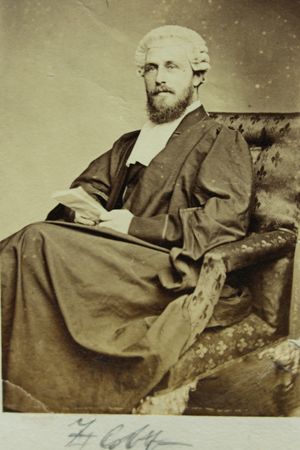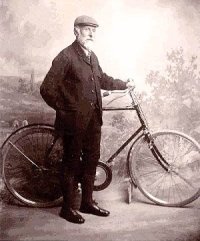Gerard Francis Cobb
 1838-1904. Classicist and scientist; Junior Bursar. A prolific composer of songs and church music; the composer of the hymn tune 'Cobb'.
1838-1904. Classicist and scientist; Junior Bursar. A prolific composer of songs and church music; the composer of the hymn tune 'Cobb'.
Cobb's parents were both musical, and he showed an early aptitude for music. His father, brother and nephew, all named William Francis Cobb, were in succession rectors of Nettlestead in Kent.
Gerard was educated at Marlborough College and Trinity, where he was elected a Scholar in 1860, and graduated B.A. in 1861 with a double first in the Classical and Moral Science Triposes. He then went to Dresden for a short time, to study music. While there, he perfected his knowledge of German) he was also proficient in French and Italian, as well as being an excellent classical scholar.
He then returned to Cambridge, where he spent the rest of his life. He was elected a Fellow of Trinity in 1863, and in 1869 was appointed Junior Bursar, holding the post for twenty-five years.
Cobb was much interested in Church matters: he was in sympathy with the Tractarian movement (associated with Newman, Pusey, Keble, Forbes and Froude) and at one time contemplated (but finally declined) holy orders. He actively advocated union between the Anglican and Roman communities, and published an elaborate treatise which caused a sensation in ecclesiastical circles. As late as the 1860s there was a form of religious intolerance which although not life-threatening (as in the reigns of earlier monarchs) nevertheless ensured that a career in the Church would no longer be an option for Cobb. His appointment at Trinity was timely, and his energies were then directed towards the running of the College and to the pursuit of music.
Cobb was a fine organist, and gave occasional recitals at Trinity. His writings include a history of the organ and an account of the choir which, apparently, he also trained. He was also the University’s representative on municipal affairs.  He became the friend and advisor of William Sterndale Bennett, George MacFarren and Charles Villiers Stanford.
He became the friend and advisor of William Sterndale Bennett, George MacFarren and Charles Villiers Stanford.
He was a great lover of outdoor activities - swimming, walking, hill climbing, and - above all - cycling. He was one of the founders - and first President - of the National Cyclists' Union (originally the Bicycle Union) and was also President of the Cambridge University Cycling Club. Cobb's enthusiasm for cycling induced not only undergraduates but even many of the dons to take to it. He celebrated his sixtieth birthday by undertaking a cycle run of sixty miles in company with one of his nephews.
In 1893 Cobb married Elizabeth Lucy Parkinson, and resigned his offices at Trinity. He continued to reside in Cambridge and devoted himself mainly to musical composition. His most popular works were settings of Kipling's Barrack-Room Ballads and his delightful Twenty-four Songs for Little People, as well as works on a larger canvas, including his most ambitious work - A Song of Trafalgar, a ballad for men's voices (solo and chorus) and orchestra, to words by Edith Nesbit.
| Memorial inscription | Translation |
|
GERARDUS FRANCISCUS COBB COLL. S.S.TRIN. PER XXX ANNOS SOCIUS NATUS ID.OCT. A.S.MDCCCXXXVIII HUIUS IN MEMORIAM PER X ANNOS SECUM CONIUNCTISSIMI |
Gerard Francis Cobb was a Fellow of the College for thirty years and Junior Bursar for twenty-five. He was a shrewd and hard-working man in business affairs, and well loved by his friends. From an early age he was a skilled and industrious musical scholar. He was born on 15th October 1838 and died on 31st March 1904. His widow dedicated this brass in memory of a husband very close to her through ten years of marriage, and now for a short time separated from her by his sudden death. |
Gerard Francis CobbBrass located on the north wall of the Ante-Chapel. |
Click on the thumbnail for a larger image. |
|
|
PREVIOUS BRASS |
|
NEXT BRASS Francis MacDonald Cornford |
| Brasses A-B | Brasses C-G | Brasses H-K | Brasses L-P | Brasses R-S | Brasses T-W |

